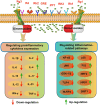Pharmacological effects of ginseng and ginsenosides on intestinal inflammation and the immune system
- PMID: 38698858
- PMCID: PMC11064651
- DOI: 10.3389/fimmu.2024.1353614
Pharmacological effects of ginseng and ginsenosides on intestinal inflammation and the immune system
Abstract
Intestinal inflammatory imbalance and immune dysfunction may lead to a spectrum of intestinal diseases, such as inflammatory bowel disease (IBD) and gastrointestinal tumors. As the king of herbs, ginseng has exerted a wide range of pharmacological effects in various diseases. Especially, it has been shown that ginseng and ginsenosides have strong immunomodulatory and anti-inflammatory abilities in intestinal system. In this review, we summarized how ginseng and various extracts influence intestinal inflammation and immune function, including regulating the immune balance, modulating the expression of inflammatory mediators and cytokines, promoting intestinal mucosal wound healing, preventing colitis-associated colorectal cancer, recovering gut microbiota and metabolism imbalance, alleviating antibiotic-induced diarrhea, and relieving the symptoms of irritable bowel syndrome. In addition, the specific experimental methods and key control mechanisms are also briefly described.
Keywords: ginseng; ginsenosides; intestinal immune; intestinal inflammation; intestinal system diseases.
Copyright © 2024 Zhao, Zhang and Zhang.
Conflict of interest statement
The authors declare that the research was conducted in the absence of any commercial or financial relationships that could be construed as a potential conflict of interest.
Figures



Similar articles
-
Ginsenoside from ginseng: a promising treatment for inflammatory bowel disease.Pharmacol Rep. 2021 Jun;73(3):700-711. doi: 10.1007/s43440-020-00213-z. Epub 2021 Jan 19. Pharmacol Rep. 2021. PMID: 33462754 Free PMC article. Review.
-
The Synergistic Effects of Polysaccharides and Ginsenosides From American Ginseng (Panax quinquefolius L.) Ameliorating Cyclophosphamide-Induced Intestinal Immune Disorders and Gut Barrier Dysfunctions Based on Microbiome-Metabolomics Analysis.Front Immunol. 2021 Apr 22;12:665901. doi: 10.3389/fimmu.2021.665901. eCollection 2021. Front Immunol. 2021. PMID: 33968068 Free PMC article.
-
Effects of fermented ginseng on the gut microbiota and immunity of rats with antibiotic-associated diarrhea.J Ethnopharmacol. 2021 Mar 1;267:113594. doi: 10.1016/j.jep.2020.113594. Epub 2020 Nov 18. J Ethnopharmacol. 2021. PMID: 33217518
-
Low-Medium Polarity Ginsenosides from Wild Ginseng Improves Immunity by Activating the AhR/MAPK Pathway through Tryptophan Metabolism Driven by Gut Microbiota.J Agric Food Chem. 2024 Nov 27;72(47):26142-26154. doi: 10.1021/acs.jafc.4c06019. Epub 2024 Nov 15. J Agric Food Chem. 2024. PMID: 39545702
-
Ginsenosides from Panax ginseng as potential therapeutic candidates for the treatment of inflammatory bowel disease.Phytomedicine. 2024 May;127:155474. doi: 10.1016/j.phymed.2024.155474. Epub 2024 Feb 23. Phytomedicine. 2024. PMID: 38471369 Review.
Cited by
-
Exploring the Underlying Mechanism of Weiling Decoction Alleviates Cold-Dampness Diarrhea Based on Network Pharmacology, Transcriptomics, Molecular Docking and Experimental Validation.Pharmaceuticals (Basel). 2025 Jan 16;18(1):109. doi: 10.3390/ph18010109. Pharmaceuticals (Basel). 2025. PMID: 39861171 Free PMC article.
-
Effectiveness of Japanese traditional medicine (Kamikihito and Saikokeishito) for treating long COVID: a prospective observational study.Front Med (Lausanne). 2025 Jul 21;12:1609812. doi: 10.3389/fmed.2025.1609812. eCollection 2025. Front Med (Lausanne). 2025. PMID: 40761857 Free PMC article.
-
Shenlian Decoction Ameliorates LPS-Related Inflammation in db/db Mice: Coupling Network Pharmacology With Experimental Verification.J Diabetes Res. 2025 Jan 6;2025:3823051. doi: 10.1155/jdr/3823051. eCollection 2025. J Diabetes Res. 2025. PMID: 39810933 Free PMC article.
-
Ginsenoside Reshapes Intestinal Microecology to Alleviate Microgravity Stress.Drug Des Devel Ther. 2025 Feb 24;19:1289-1303. doi: 10.2147/DDDT.S486371. eCollection 2025. Drug Des Devel Ther. 2025. PMID: 40026331 Free PMC article.
-
Progress of traditional Chinese medicine in the prevention and treatment of colorectal cancer.World J Gastrointest Oncol. 2025 Jun 15;17(6):105690. doi: 10.4251/wjgo.v17.i6.105690. World J Gastrointest Oncol. 2025. PMID: 40547140 Free PMC article. Review.
References
-
- Molodecky NA, Soon IS, Rabi DM, Ghali WA, Ferris M, Chernoff G, et al. . Increasing incidence and prevalence of the inflammatory bowel diseases with time, based on systematic review. Gastroenterology. (2012) 142:46–54.e42; quiz e30. - PubMed
Publication types
MeSH terms
Substances
LinkOut - more resources
Full Text Sources
Research Materials

